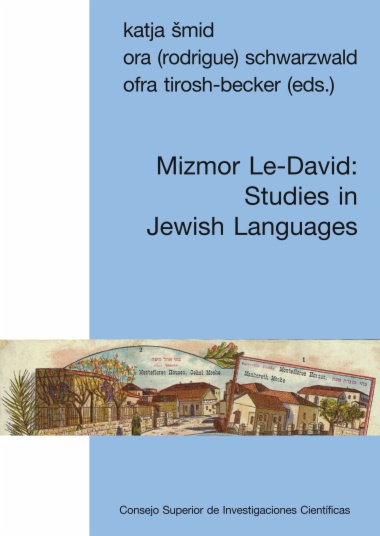

Mizmor Le-David: Studies in Jewish Languages brings together twenty-six essays by leading scholars in Jewish and Hispanic studies from the most prestigious universities and research centers of Israel, Europe and the United States. Their contributions focus on the languages, literatures, cultures, and history of the major ethnic sub-communities of the Jewish people in their rich diversity. Topics in the Hebrew language and Jewish Diaspora languages, such as Jewish Aramaic, Judezmo/Judeo-Spanish, Haketia, Yiddish, Judeo-Arabic and Judeo-Italian, receive detailed treatment. Fourteen of the studies are in English and cover a wide variety of linguistic topics, such as the synchrony and diachrony of Judeo-Spanish from the sixteenth through twenty-first centuries, the Hebrew and Aramaic component in Jewish Languages, and the influence of Biblical Hebrew on Palestinian Amoraic Hebrew. Literary studies examine numerous genres cultivated by Jewish language speakers: proverbs and sayings, rabbinical writing, journalism, the memoir, historical writing, liturgical composition and music, ballads, travelogues, and contemporary drama. Most of the essays are devoted to Judeo-Spanish and its literature, but other Jewish languages, spoken in diverse Jewish communities throughout the vast Sephardic diaspora (Salonika, Vienna, Belgrade, Tetuan, and others) are also represented. The book includes six contributions in Spanish by distinguished experts in Sephardic studies, who offer linguistic analyses of Judeo-Spanish verbal periphrasis and adverbial forms, literary studies of Sephardic Purim coplas of historical-biblical content, Judeo-Spanish chronicles about the city of Constantinople, a chronical from a Spanish Africanist review that presents us with an account of the languages and schools of the Sephardim of Morocco, a controversial polemic on the differences between Sephardim and Ashkenazim as waged on the pages of Ladino and Yiddish newspapers, and a depiction of Sephardic translators based on a close analysis of introductory paratexts in Ladino books from the nineteenth and twentieth centuries. Six of the contributions are in Hebrew. Written by some of Israel’s leading Jewish language specialists, several of them assume a comparative, Jewish intralinguistic approach, examining the influence of languages in contact in the case of Hebrew and Judeo-Arabic in North Africa. Other studies focus on the use of the linguonym «Haketia » to denote the language of the Sephardim in Morocco; the types of variation encountered in Judeo-Arabic; foreign words appearing in two books composed in Hebrew and Yiddish; the Ladino used in a statute of a Jewish association in mid-nineteenth-century Edirne; and the importance of the Jewish printing houses in Salonika. The contributions are brought together to honor Professor David M. Bunis of The Hebrew University of Jerusalem, a leading, world-renowned scholar of Judezmo/Ladino, Yiddish and other Jewish languages, on the occasion of his seventieth birthday.